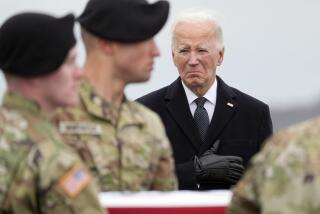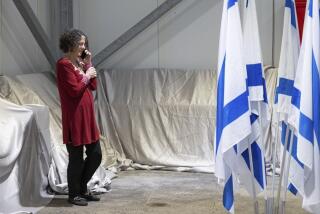A Cautious Euphoria for Families
Donna Wishmire, mother of two sons and a daughter deployed on the front lines in the Persian Gulf, pulled her chair close to the television in her El Cajon home.
“That’s great, life can go forward now,” murmured Wishmire, her eyes filled with tears, as President Bush announced the cease-fire that seemed to signal the likely end of the bloody conflict. “I just wonder when they will come home,” she added, folding and refolding her hands.
At the Non-Commissioned Officers Club at Camp Pendleton, the 30 Marines present broke into hoots and applause when the President detailed the suspension of combat but warned that troops would renew fighting if the Iraqis did not adhere to his terms.
“It’s sweet victory,” said Staff Sgt. Lee R. Crouch, who, like others, voiced disappointment only that Iraqi President Saddam Hussein remains in power.
The underlying joy at Bush’s announcement seemed to be shared by all of the families and friends of the 50,000 or so San Diego-area military personnel assigned to the Gulf, one of the largest such contingents for any single U.S. community. For many, however, the elation was guarded, the better to defend against future disappointments.
There was, of course, the great satisfaction of knowing that the hostilities that had taken their loved ones away might soon be over, and that their sons and daughters, husbands and wives, might be home within weeks.
But, having prepared themselves for the potential that the worst could happen, they remained soberly aware that something could still go wrong. For many, premature euphoria was a trap they were determined to avoid.
“Everything sounds real good, but I’m not going to get my hopes up only to have them shattered again,” Karyl Ketchum, a 35-year-old Oceanside mother of two, said after she heard the President speak. “It sounds great. But only when I see the men come home will I let myself release. I’ve got a big wall built inside of me, mentally and emotionally.
Her husband of 11 years, Dwight (Ike) Ketchum, is a Marine staff sergeant specializing in communications, assigned to a light armored vehicle. He has been in the Gulf since August; he was in the same unit as the Marines who were killed by friendly fire during the battle for the Saudi coastal town of Kafji.
“He knew all the guys who got killed,” Ketchum said. “He’d call as often as possible. And after that happened, he said he was scared to death. He said no one could prepare you for that (combat).”
While the imminent return of all troops remains uncertain, there is, of course, particular concern for those who remain in enemy hands. In his address, Bush said the release of all prisoners of war would be an integral part of any peace settlement, a statement that bolstered the hopes of the relatives of those held captive.
“It’s wonderful,” Mary Hunter said from her Camp Pendleton home after the President’s speech. Her husband, Guy, a Marine pilot, was shot down over enemy territory and is now believed to be in captivity in Iraq.
“I’m another step closer to seeing my husband,” Hunter said. “All the time, I’ve had very good hopes of seeing my husband.”
In recent weeks, many military families have been understandably tied to their televisions, eager to hear the seemingly endless procession of developments in the war. On Wednesday, news of the President’s speech, amid rumors that the war would soon be over, spurred hope anew.
On Wednesday night, her family room in disarray, Karyl Ketchum put her portable TV on top of an upside-down milk case, turned on CNN, hunkered down cross-legged on her sofa, fidgeted with a pair of chopsticks and listened to the President.
When Bush offered his pride for the troops, she interjected: “I can’t believe how few casualties there’ve been. It’s really remarkable.”
After Bush listed the conditions to be met after the suspension of combat, Ketchum chuckled. “He’s added some things,” she smiled.
When he warned what would happen if the Iraqis didn’t comply with the conditions, Ketchum said, “As soon as they (the Iraqis) fire, it’s back to fighting.” She clicked her tongue.
And when the President was finished, she was quiet for maybe 15 seconds.
“Well, that’s that. Thank God. Now, send them home!”
Upstairs, Ketchum’s two children--Dwight, 7, and Kim, 9--played raucously. She apologized. They aren’t sure whether they’ll ever see their father again, she explained, because he’s in a war and, after all, people don’t come back from war. So the kids have been a handful.
Ketchum, a physical education specialist for the Oceanside school district whose deep, gravelly voice suggests the strain of yelling on playing fields, said she has spent much time tempering the mood of other Marine wives who overreact to every glimmer of hope that the war might be ending.
“There’s one woman at school who has spent a lot of time crying. And today, she said, ‘Oh, he’s coming home!’ I said, ‘Yeah, soon.’ I don’t want to burst her bubble.”
When will Karyl Ketchum believe that her own husband is coming back?
“When I see him back in this house, yelling at me (for remodeling the kitchen) and helping me fix it all, then I’ll know it’s all behind me,” Ketchum said.
At the Wishmire household in El Cajon, there was an aura of expectation as the time for the President’s speech approached.
Harry Wishmire dashed into the kitchen pulling out a bottle of champagne that he and wife Donna had had on ice for the past two weeks as they awaited good news.
“I thought this would be a long, drawn-out ordeal with lots of pain,” Donna Wishmire said.
Daughter Shelley Robertson, 23, is in the Army’s 327th Signal Corps, based in Ft. Bragg, N. C. She was married three months before she was shipped out in August with the 82nd Airborne Division.
Two weeks later, Wishmire’s youngest, Thomas Caywood, 20, shipped out. He is a military intelligence specialist with the Army’s 2nd Battalion assigned to the 69th Armored Division at Ft. Benning, Ga.
And finally, son Lance Cpl. Jeff Caywood, 25, a tank driver with the 1st Marine Division at Camp Pendleton, left Feb. 4 for the Middle East.
With her three children in the thick of battle, Donna Wishmire has been so full of anxiety that she has eaten nothing more than an occasional yogurt. She picked up her champagne Wednesday as her husband toasted: “To all the fathers, mothers, wives and children who feel this wonderful sigh of relief tonight that this is over. May there never be another one.”
Shelley Robertson called home Friday for the first time in three months. The young woman had driven two hours to reach a telephone. She had not seen either of her brothers for months. She called to tell her mother that she was going into battle.
“ ‘Mom, don’t expect to hear from me until I get back,’ ” Wishmire recalled her daughter saying.
Then the two talked of brighter times. They planned a big party and Shelley asked her mother to cook lasagna. When the 15-minute call was over, Wishmire’s nerves were jangled.
“You always think maybe this is the last time I get to talk, but there wasn’t any crying or ‘Oh my God, what is going to happen.’ You just talk matter-of-factly.”
In the days since the call, Wishmire has wondered if she will ever see her three children again. But after Bush’s announcement, she began planning their homecoming.
“I’m deliriously happy,” she said. “We really dodged a bullet on this one.”
This story was written by Times staff writer Patrick McDonnell using reports from Times staff writers Nora Zamichow, Tom Gorman and Ray Tessler.
More to Read
Sign up for Essential California
The most important California stories and recommendations in your inbox every morning.
You may occasionally receive promotional content from the Los Angeles Times.










